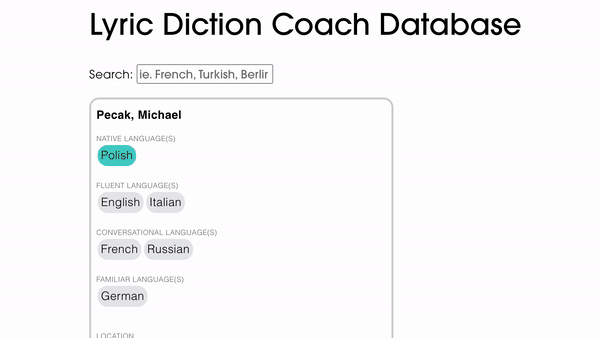Quarter Tone Keyboard
I’ve recently started studying Arabic music and was looking for a virtual keyboard to help me practice my quarter tones. After not finding a simple tool, my super cool husband suggested trying to use ChatGPT to generate one. With his help generating the first couple of queries, I was quickly able to edit this and thought it was just too cool to keep to myself! I hope you find it useful!
2023 NATS Talk on Operatic Activism - Resource Page
Below are some links I will reference in the talk today. If you have any trouble finding something I mention, please don’t hesitate to reach out to me personally.
Art Song Project Sample Curriculum
The following is a curriculum designed to help organizations, institutions, and individuals structure their own art song commissioning projects. It is highly flexible and not intended to be comprehensive, rather a starting place to begin structuring your project design. I’m happy to discuss specific details and brainstorm curriculum. Please reach out if you are interested in a commissioning project but don’t know where to start; I’d love to work with you or connect you with a helpful colleague!
Sample Timeline for Call For Proposals
This is a sample timeline for singers/composers looking to create a similar project to my 2020 Call for Proposals. I commissioned an entire recital worth of new repertoire and this is my ideal timeline for such a project. This page was created as a resource for my Sample Curriculum.
Strong Women Make Waves
Today, in this place of taking care of myself, I see a much truer and more sustainable vision of strength. We are stronger when we are nourished, healthy, and have a good community to collaborate with.
How is Opera a Universal Language (United Nations Webinar)
On February 11, 2022, I was invited to present at a webinar entitled “Human Rights, Art & Protest” hosted by The United Nations Human Rights Office of the High Commissioner and Freemuse. It was a huge honor to speak with other artists who use their art to respond to societal pressures for an audience of activists and organizers working to support the freedom of creating art and human expression. I encourage you to watch the entire webinar, but below is my response to the prompt from the mediators.
Learning to Cross the Canyon
Often, when one is in the novice phase of any new endeavor, the overall idea seems straightforward and simple: all we need is a guide or teacher to help us get going and we’ll be on our way, right? It is challenging when a student first jumps into voice lessons assuming that a couple of tricks is all it takes to get them going on their dream. As someone who has spent decades of dedicated study, rigorous practice, iteration, and overhauls, it is almost offensive when someone expects to master those coordinations with some magical voice lesson. I was teaching a lesson of this nature when the image of a canyon came to mind and I love it as a metaphor for building patience in our learning process.
Introducing: The Lyric Diction Coach Database
I'm so excited to show you my new project, this is The Lyric Diction Coach Database, which I built to give classical singers an easy way to find coaches who work in languages beyond the traditional classical canon…
Lemon, Ginger, Thyme Tea Recipe
I love this tea for taking care of my throat. It can help you fight off something that is just hinting or help in the recovery from a big cough. I brew it every time my throat feels a little funky and it is a tasty & soothing treat for our whole family…
Building a Practice Routine
Building a practice routine is one of the greatest things you can do for your singing. If this is new to you, it can seem super intimidating. Where do I even start? What do I do? How do I know if it’s right? How long do I need to practice? These thoughts are all totally normal and I’ve got some ideas to help!…
Be an explorer
Maps are representations of territories made by people who have done their own research and exploration. When we are following driving directions and google maps tells us to continue onto a closed road, we follow the territory and the map adjusts. This concept can be useful for much more. We are given “maps” for career/academic directions, societal expectations, news/politics/world views, etc. but rarely do we step back and see it as information that was already curated and simplified, let alone ask ourselves who is the cartographer.











